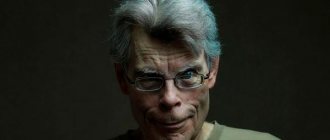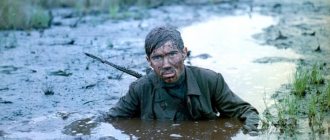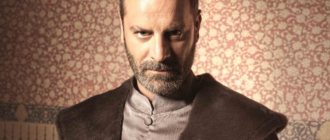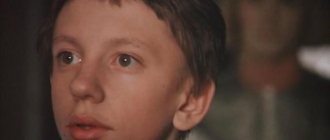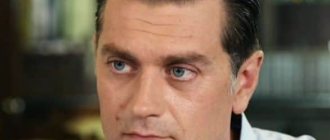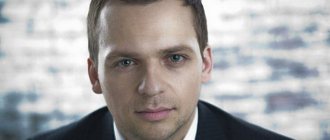A bully and a gambler: the director's childhood
Alexey Balabanov in childhood. Photo: uznayvse.ru
Alexey Balabanov was born in Sverdlovsk (today Yekaterinburg). His parents were still students at that time: his father was in his last year of law school, his mother was finishing medical school. After university, Oktyabrin Balabanov became a correspondent for the regional youth newspaper “Na Smenu”. The editor of the publication was the future Minister of Culture of the RSFSR Yuri Melentyev, with whom they became not only colleagues, but also friends. When Melentyev left for Moscow, he appointed Balabanov Sr. as his successor. Soon the father of the future director went to work at the Sverdlovsk film studio, where he was an editor in the department of popular science films. Based on his scripts, the films “Cast Iron Lace”, “The Word of the North”, “The Ural Experience” were shot.
Mother, Inga Balabanova, after the birth of her son, decided to continue her studies: she entered residency and began scientific work. At the age of 35, she defended her doctorate, and in 1972 she became director of the Sverdlovsk Institute of Balneology and Physiotherapy. The work involved frequent business trips, including abroad.
The parents worked a lot; they hardly raised their son. Alexey Balabanov talked about his childhood: “I grew up as a hooligan, I shot a lot with a slingshot. I made “bombs” and placed them in trash cans, there used to be iron ones, and waited for the reaction of passers-by. Played cards." Mom insisted that Alexey Balabanov study at a school with in-depth study of a foreign language: he studied English from the second grade.
In high school, Alexey Balabanov, together with his friend Evgeniy Gorenburg, created the musical group “Keri”. The future director was a guitarist. Young people played popular songs by The Beatles, Deep Purple, Led Zeppelin. In 1976, Balabanov graduated from school. He came to the presentation of the certificate without two teeth: on the eve of the prom, Balabanov got into a fight over a girl.
Childhood and youth
On the 9th day of autumn 1958, a son, Seryozha, was born into the Balabanov family, who lived in then Sverdlovsk. As the actor later said, his childhood was varied: there was a place for sports, pranks, and a drama club. From an early age, the boy enthusiastically visited the Uralmash Palace of Culture and appeared on stage in children's performances and at New Year's matinees. In the latter, the student often agreed to the role of the pioneer Vitya, saving Santa Claus.
He received his secondary education at local school No. 28 and successfully passed the entrance exams to the theater school. After studying for a year, the guy and his friends went to Moscow in Chekhovian style, enrolling in GITIS with them.
Sergei Balabanov in his youth (still from the film “White Horse - Woe is Not Mine”)
The course of Yuri Zhigulsky, where the student was enrolled, was recruited at the Youth Theater and RAMP. Therefore, soon the young man actively appeared in productions of the Theater for Young Spectators and knew where he would serve after graduating from university.
Thanks to photographs on personal pages on the social networks VKontakte and Facebook, it is known that both of the artist’s grandfathers participated in the Great Patriotic War. Nikolai Vasilyevich went to the front in 1942, reached Berlin, and in 1945 he made the legendary forced march to Prague and returned alive.
Private shooter Sergei Markelovich Chikalev, who came into this world in 1908, unfortunately died in 1943. The celebrity tries to pay tribute to his veterans every year by joining the “Immortal Regiment” campaign with his son.
Despite the similarity of surnames, the man is not related to the cult director Alexei Balabanov, who directed “Brother”, “Brother-2”, “Cargo 200”.
Ethiopia, Syria, Angola: Balabanov - military translator
Alexey Balabanov. 1980. Sverdlovsk. Photo: session.ru
Alexey Balabanov. Photo: session.ru
Alexey Balabanov during his military service. Photo: session.ru
Immediately after graduating from school, Alexey Balabanov entered the translation department at the Gorky Pedagogical Institute of Foreign Languages in Nizhny Novgorod. He later recalled: “[My parents] poked me - I didn’t care where to study. I was going to the Polytechnic because everyone was going there from school, although I didn’t understand anything at all about physics. Neither in physics nor in chemistry. But everyone entered UPI, the Ural Polytechnic, it is the largest, the whole city. But my parents decided differently - I am grateful to them.” In 1980, the director spent six months on an internship in the UK: first he lived in London for two weeks, the rest of the time in Manchester. From the trip, Balabanov brought many records of foreign music. When he returned to Russia, he became a DJ at university discos. The future director often went to the cinema and kept a diary, where he wrote down his impressions of watching films.
In my third year at the linguistic institute, I realized that I would work in cinema. It didn't matter who, I didn't care. At any cost - but in the cinema.
Alexey Balabanov
In June 1981, Alexey Balabanov graduated from the institute. For the next two years, the director served in the army. The military registration and enlistment office offered a choice of distribution: aviation with flights to the countries of the Middle East or service in Ethiopia. Balabanov chose the first. In order to pass the selection, he memorized a table for testing eyesight - only those who saw all the lines were allowed to fly, and the director was myopic. In the fall of 1981, the graduate was sent as a military translator to Yemen. “At the moment I feel great, although they didn’t give me a bed or a pillow <...> They gave me 11 dinars - I only spent 4, I don’t know what to do with the rest. It’s a pity that I only bought one set of pens, but both my dad and mom needed <...> Yes, they probably won’t give me permission, but maybe tomorrow I’ll swim in the ocean, and that will be great. Tomorrow to Ethiopia and back here" , Balabanov wrote in his diary on December 24, 1981.
Alexey Balabanov flew to Angola, Ethiopia, Equatorial Guinea, and Syria. In order to fly more often and not be in control, the director studied English with the major’s son, who was responsible for the flight schedule. He learned about what was happening in Afghanistan at that moment from his colleagues.
The first time I understood what war was was when in Ethiopia we got into a car and they told me to sit behind the driver. To cover up. Yeah I understood? On the one hand it is cynical, and on the other hand it is rational. This was the first feeling of the war - that they could kill here.
Alexey Balabanov (interview with the men's magazine "Bear")
A few months before the end of his service, the director was fired from aviation: first he was late for a flight in Hungary because he was buying musical heads, and then he sent a friend an anecdote about the first secretary of the Central Committee, Leonid Brezhnev. Balabanov recalled: “The joke is this: “Brezhnev looks in the mirror and says: “Oh, this Tarkovsky is for me.” They didn't understand him for sure. They didn’t understand, but since it was about Brezhnev... I wrote this in a letter to a person who was entering the camera department.” He was transferred to the Navy and sent as a translator to a submarine repair shipyard in Riga.
Biography of the director
You will learn about the cause of death of Alexei Balabanov from this article. The director was born in Sverdlovsk in 1959.
It is interesting that Balabanov stood out among his peers since childhood for his craving for foreign languages. This was due to the desire to travel a lot in the future, which decided his choice of profession. He graduated from a local school and entered the Pedagogical Institute of Foreign Languages in Gorky.
While serving in the army, he visited countries in Asia and Africa and took part in the war in Afghanistan. He finished his service in the navy, and since then the naval vest has been his favorite clothing.
He began his creative career as an assistant director at a film studio in Sverdlovsk. He received his film education at the Higher Courses for Scriptwriters and Directors, which he graduated in 1990.
In Sverdlovsk, he was greatly influenced by the underground culture, which was rapidly developing at that time. Despite the fact that the city was far from Moscow and Leningrad, its own school of rock music was born here, from which many famous bands emerged. Balabanov closely communicated with the musicians of the Nautilus Pompilius group, and used their songs in several of his films.
Balabanov was married twice. From his first wife Irina he left a son, Peter. He met Nadezhda Vasilyeva, his second wife, on the set of the film “Castle”. She worked as a costume designer. In 1994, Peter was born.
Vasilyeva was next to the director until the very end.
Travels to the ends of the world, first films and Sverdlovsk rock
Still from Alexey Balabanov’s feature film “Nastya and Egor”, 1989
Nautilus Pompilius in the feature film “It Used to Be a Different Time” by Alexei Balabanov (1987)
Still from the feature film “I Have No Friend” by Alexei Balabanov, 1988
In 1983, Alexey Balabanov was demobilized from the army. His father was able to negotiate his admission to the All-Russian State Institute of Cinematography (VGIK) in the screenwriting department of popular science films. However, Balabanov did not study there for long: at the very first exam, the teacher criticized his story “Birthday”, and he took the documents from the institute. In an interview for the book “Balabanov,” the director said: “He tells me: “They will make a movie based on your script. How can you stop the water from burning your feet?” I looked and thought: “What, stupid?” He left the session and never came back.” He returned to his hometown and got a job at the Sverdlovsk film studio. He was hired as the third assistant director - the lowest position. The work involved frequent business trips: films were shot in the Far East and the Far North, in Siberia. When Balabanov had free time, he went to the Sverdlovsk rock club. There he became friends with Vyacheslav Butusov and Dmitry Umetsky, the founders of the musical group Nautilus Pompilius.
In 1987, he successfully passed the entrance examination and entered the Higher Directing Courses in Moscow. Alexey Balabanov took the course “Auteur Cinema” with the famous director Boris Galanter. In the same year he shot his first short feature film, “It Used to Be a Different Time.” The picture appeared by chance: an acquaintance of a student operator asked Balabanov to help him with his course work. Filming took place in Sverdlovsk. The director wrote the script overnight and recruited his rock musician acquaintances as actors. This was the story of a girl who was betrayed by her lover. The main action took place in the restaurant where Nautilus Pompilius played. The musicians of the “Ural wave” also starred in Balabanov’s next two films: “I Have No Friend” about guitarist Yegor Belkin and “Nastya and Yegor” about the uneasy love between two rock performers.
During his studies, Alexey Balabanov lived in a dormitory. There he met Sergei Selyanov, who was studying at the feature film department. Before taking directing courses, Selyanov had already worked as an editor at Lennauchfilm and secretly filmed the film “Angel’s Day.” They quickly became friends. In an interview for the film “Balabanov” directed by Lyubov Arkus Selyanov said: “We met and immediately started talking about cinema. And after a few minutes it became clear that we somehow understood him very much in the same way. We speak differently, perhaps, but we feel the same. Like in “Mowgli”: you and I are of the same blood, you and I.”
In Moscow, Balabanov met his future wife Irina. They met at a party of mutual friends, and he immediately jokingly proposed getting married. Soon the wedding took place for real. Their son Fedor was born, and Irina Balabanova moved with the child to Sverdlovsk, where the director’s parents helped with the upbringing.
Theater of the Absurd: adaptation of Beckett and Kafka
Alexey Balabanov on the set of his feature film “Happy Days”. Photo: session.ru
Alexey Balabanov (center) on the set of his feature film “Trofim”. Photo: session.ru
Viktor Sukhorukov in Alexey Balabanov’s feature film “Happy Days” (1991)
In 1990, Alexey Balabanov successfully completed the courses and moved to Leningrad. Sergei Selyanov helped his friend get a job at Lenfilm in the workshop of the famous director Alexei German. A year later, Balabanov began filming the film “Happy Days.” The script was created based on the work of the Irish writer Samuel Beckett. The main character of the film, a little man without a name or past, wanders around the city and becomes a different person for passers-by every time. The male role was played by actor Viktor Sukhorukov.
On Happy Days [Balabanov] made me wear shoes half a size too small, which were too tight. We filmed in a cemetery in winter, and my feet froze. I told him: “My feet are freezing...” And he: “Nothing, no matter, be patient...” Then it turned out that this was all on purpose. He needed my torment to be conveyed through his eyes.
Viktor Sukhorukov (program “Visiting Dmitry Gordon”)
The film was released in 1991. Nadezhda Vasilyeva, Lenfilm’s costume designer, came to its premiere screening at the House of Cinema. In an interview with Yuri Dudya, Vasilyeva recalled: “I sat in the auditorium and watched “Happy Days.” I didn’t even pay attention to who represented him on stage <…> And I realized that I would like to marry this man. Because on the screen there was the world of a person very close to me in spirit." . We met personally at the film studio: Balabanov was working on his second film - an adaptation of Franz Kafka’s novel “The Castle”. They fell in love with each other. Balabanov divorced his first wife and proposed to Nadezhda Vasilyeva.
In 1992, Sergei Selyanov, Vasily Grigoriev and Alexey Balabanov, together with the Lenfilm studio, founded the STV film company. Balabanov shot all his subsequent films with her participation. For the 100th anniversary of cinema in 1995, the director released a short film “Trofim”, which was included in the anthology “The Arrival of a Train”. Balabanov remade the famous film by the Lumiere brothers, adding the main character. The center of attention was one of the train passengers - a village man who, out of jealousy, killed his brother with an ax and fled from the village.
Immediately after Trofim, Alexey Balabanov wanted to start filming the film About Freaks and People. The script for the film was already ready. However, the producers did not like the idea of making a film about the first producers of pornography, and the director did not have his own money. To make money, Balabanov decided to make a mass-produced movie about bandits and musicians.
"Brother" - a cult movie of the 1990s
Alexey Balabanov on the set of his feature film "Brother". Photo: session.ru
Sergei Bodrov and Alexey Balabanov (right). Photo: hmtk.ru
Svetlana Pismichenko as Sveta and Sergei Bodrov as Danila Bagrov on the set of the feature film “Brother” by Alexei Balabanov. Photo: kino.ru
In 1996, at the Russian film festival “Kinotavr”, Alexey Balabanov met Sergei Bodrov Jr. The actor starred in the film “Prisoner of the Caucasus” and received a prize for “Best Actor”. Balabanov recalled: “I really liked him then. I suggested to Seryozha: “Let’s make a movie together. But I don’t have any money.” He says: “Come on.” I told him the idea of "Brother". Bodrov agreed. They quickly found a common language and became close friends. The film's budget was 100 thousand dollars - small by the standards of the film industry. They saved on everything: filming took place in the apartments and dachas of the director’s friends, and they played in their own clothes. Actors Sergei Bodrov, Viktor Sukhorukov, Svetlana Pismichenko starred in the film for free.
Foreigners filmed Anna Karenina. They left, and one acquaintance said to me: “Seryoga, do you need some film?” The Americans left them - the boxes were opened, but wrapped up. <...> The film turned out to be good, fresh - Kodak, there were no problems with it. <...> Those who had a car drove them by car. We rented apartments from acquaintances. I had my own lighting equipment. The make-up girls cooked sausages and potatoes for lunch.
Sergey Astakhov, cameraman (Maria Kuvshinova “Balabanov”)
The film was completed in 31 days, and already in 1997 it was released on the big screen. The crime drama about Danil Bagrov, who moved from the provinces to St. Petersburg and became a killer, immediately became a cult classic. The character of Sergei Bodrov was called “the hero of the new generation.” Balabanov said about the film: “This is a life experience, that’s all. These are people's stories. I had a couple of such acquaintances who returned from the war and became bandits. But then there were countless of them in the country.” The director paid much attention to music: the film featured the bands Nautilus Pompilius, Chizh, Aquarium, Kolibri and the guitarist DDT.
The eight heroes of “Brother” speak from the screen in voices other than their own: Alexey Balabanov re-voiced the actors. The role of Viktor Sukhorukov, who played Danila Bagrov’s older brother, was dubbed by Alexey Poluyan. In an interview with Yuri Dudu, Nadezhda Vasilyeva said: “He believed that sound was filming a film for the second time. The main thing for him [Balabanov] was to combine incompatible things: there was only one role, it was played by an artist. And then another artist played the same role. And he took it and glued it together. This is interesting. Additional energy appears."
To be honest, I think about this film, my hero, all the time, and this picture appears before my eyes. Primitive people are sitting around the fire. Cave. There is primeval chaos all around. Animals walk around, all kinds of lizards. And suddenly one person stands up and says: “Now it will be like this - you need to protect your brother, you need to protect a woman, you need to protect the weak!” And these are the only words that are heard in this chaotic primitive world.
Sergei Bodrov, actor
In 1997, the film “Brother” was shown in the Cannes “Un Certain Regard” program. The film received the Kinotavr Grand Prix, a Gold Medal at the festival in Trieste, Italy, and the Nika Award for best film.
"Brother"
Balabanov’s first big success was the crime drama “Brother,” released in 1997. This is a story about Danila Bagrov, who returned from the army (played by Sergei Bodrov Jr.), who comes to his hometown.
A boring life does not suit the hero of this film, so he goes to St. Petersburg to visit his older brother, who, according to rumors, has become a big man during this time. When he finds it, everything turns out to be not so simple. His brother works as a hitman. Danila will have to face the criminal world of the 90s, not for a minute, without forgetting his integrity and keen sense of justice. Bagrov became the hero of an entire generation, and Bodrov became one of the most popular actors of the 90s.
The film received the Grand Prix of the Kinotavr festival and many other awards.
Balabanov’s favorite film: “About Freaks and People”
Alexey Balabanov. Photo: session.ru
Still from Alexey Balabanov’s feature film “About Freaks and People”, 1998
Sergei Makovetsky as Johann in the feature film by Alexei Balabanov “About Freaks and People” (1998)
"Brother" was a commercial success. Having earned money, Alexey Balabanov returned to the script for the film “About Freaks and People.” I filmed in my communal apartment in St. Petersburg: high ceilings and a Dutch oven helped recreate the atmosphere of the early 20th century. According to the plot, Mr. Johann is obsessed with pornographic photos and wants to make money from their production. He calls the intellectual Putilov as a business partner. The main roles were played by Sergei Makovetsky and Viktor Sukhorukov - actors who had already worked with the director in his other films. In an interview with Yuri Dudu, Sergei Selyanov recalled: “It’s not that Lesha didn’t talk to the actors. He didn't rehearse. He saw a person and understood whether he was suitable for him or not <...> His main remark was “overheated.” So he outplayed. He told the artists: “Don’t play.” Don't play that's all" . Despite the advent of digital shooting technology, Balabanov shot on film.
The film is made from cows - from gelatin. This is a living substance. It stores the energy you give. But the number does not convey energy. Kodak raises special cows, a special variety, from which they then make film. So I shoot with it.
Alexey Balabanov (interview with Medved magazine)
Alexey Balabanov considered the film “About Freaks and People” the best in his directorial career. The premiere took place in 1998 at the Cannes Film Festival. The film was highly praised by critics: for the second year in a row, Balabanov’s film became the best at the Nika Award.
“What is strength, brother?”: Balabanov about bandits, Yakutia and war
Alexey Balabanov (center) on the set of his feature film “The River.” Photo: yaplakal.com
Still from Alexey Balabanov’s feature film “War”, 2002
Sergei Bodrov as Danila Bagrov on the set of Alexei Balabanov’s feature film “Brother 2”. Photo: vsevkurse.com
In 2000, Alexey Balabanov took on the second part of the film “Brother”. The director decided to continue the story of the heroes, but in the comedy genre. Some episodes were filmed in the USA. In an interview for the book “Balabanov,” the director said: “Brother 2 is an expensive and pop movie. People just like it, more than the first <…> People were crying in the hall, with the people when you watch the second film, they react completely differently than to the first <…> It’s such a delight” . The film contained even more music than in the first part of “Brother”: compositions were performed by “Spleen”, “BI-2”, Zemfira, Chicherina, “Agatha Christie”, “Okean Elzy”.
At the same time, the director was working on the script for the film “The River” about the life of Yakut lepers. Balabanov wanted to film the story “The Limit of Sorrow” by the Polish ethnographer Waclaw Seroshevsky. Filming took place in the Murmansk region. The work was interrupted by tragedy: the lead actress, Tuaira Svinoboeva, died in a car accident. She was in the same car with Balabanov and his family. At one of the turns the car skidded and flew off the road. Everyone except the actress survived, but received serious injuries. The director decided not to continue working on the film. A few years after the accident, the footage was edited as a short film: the episodes were connected with voice-over text.
In 2002, Alexey Balabanov released the film “War” about the second Chechen war. Filming took place in relatively calm Kabardino-Balkaria, we lived in the houses of local residents. While working, the creative team was guarded by a special rapid response squad. Before arriving in the Caucasus, the director carefully prepared: he watched newsreels, met with commanders of troops in Chechnya, and collected stories of prisoners. The cast was international. The main roles were played by Alexey Chadov, Ingeborge Dapkunaite and British actor Ian Kelly. They sat in dug holes for several hours: Balabanov believed that films about war should not be shot in pavilions with scenery.
Poor Ian didn’t speak a word of Russian at all, and Dapkunaite lives in England. And he kept rushing to her, complaining about how he was forced to sit in a hole, how he was forced to climb into the river, how he almost drowned there, how Balabanov told someone right in front of Ian that he was a bad actor. And Inga patiently explained that the Russians always work like this, that the Russians have this practice, that the Russians always yell, and if they start shooting, then only with real cartridges. Therefore, it is customary for Russians to truly drown and truly escape.
Sergei Bodrov in an interview with journalist Elena Kutlovskaya
For greater authenticity, Balabanov invited non-professional actors: many Chechens were played by local residents, Russian military men were played by real soldiers. One of the days almost ended in ethnic conflict: a filming helicopter accidentally dropped a shell on an old cemetery, and it caught fire. Only the former Chechen captain, who was guarding the film crew, was able to calm down the local residents.
Alexey Balabanov: “God helped, so it was not in vain...”
Having made folk films, “Brother” and “Brother 2,” he gave the country a superhero, a fighter for justice, and created the “face of a generation.”
To find out how these lyrical action films were filmed, I once went to visit Balabanov in St. Petersburg. I remembered the interview with him for many years. During my time working at the newspaper, none of the interlocutors told me: “The conversation is over. I'm not interested in you. I went."
This was all Balabanov. He loved to tease and provoke, to overthrow sacred cows, to violate moral principles. But at the same time he said: “I am a patriot, a Russian person. I love my homeland."
The rest is behind the scenes.
“There was no lofty idea. We don’t shoot with ideas.”
I met with Alexey Balabanov two years after the tragic events when the huge Kolka glacier collapsed on the Karmadon Gorge. Hundreds of people remained under thick black ice, among them the film crew of Sergei Bodrov Jr. A good director, a wonderful actor and a kind person are gone.
His most popular role was Danila Bagrov. Balabanovsky superhero. Brother, a silent, charming killer who, without any pathos, having returned from a war to nowhere, easily and serenely won the hearts of the audience.
I watched “Brother 2” ten times, no matter how much they told me that “this is a collection of jokes from Brighton.” Having decided to write about how the cult film was filmed, I arranged a meeting with the director, producer, cameraman and actors.
Alexey Balabanov rode up to a meeting in a St. Petersburg cafe on a rusty bicycle. The wheels lacked spokes, and the pedals made a terrible grinding noise. The director was wearing burnt-out sneakers and a T-shirt with a large yellow spot on his stomach.
When asked how the idea for the film “Brother” was born, director Balabanov answered briefly: “There was no money to make intellectual films. And we shot “Brother” at virtually no cost. At that time, pulp literature was already very popular. There was no high idea at all. We don’t shoot with ideas...”
Balabanov filmed the first “Brother” in St. Petersburg with a small group. Filming took place in the apartments of friends, in the workshops of familiar artists... Someone gave up their car for a week, someone cooked sausages in the kitchen for the film crew.
With “Brother-2” everything was different. It turned out that raising money for this movie was much more difficult than everyone thought. At the last moment, some of the partners simply disappeared... “We started filming, realizing that this was a pure adventure,” said the director. - But somehow I was lucky. God helped, so it was not in vain...”
For Balabanov, it was very important that everything be authentic. Therefore, in the film he involved people who play themselves. “It adds a certain amount of credibility to what you’re looking at,” the director explained. — When in the first “Brother” Slava Butusov appears alive, and real musicians are sitting next to him, you believe that Danila is the same. I didn’t invent this technique, but it’s close to me. I am a documentarian by training.”
Yuri Shevchuk was also supposed to perform the song in the film. A poster for the film “Brother-2” was even released, where it was written: Shevchuk and “DDT” were singing. “Yuri agreed, but at the last moment he jumped off,” the director recalled. — He said: the script is shit, I don’t want to participate in it. He let us down. As for the rest, I’ve known all these guys for a long time; I’ve been friends with the Nautiluses since ’85. There was always someone hanging out in my one-room apartment. Slava Butusov sang the song “I want to be with you” for the first time at my home. “Agatha Christie” was called “RTF” - “radio engineering department of the Ural Polytechnic Institute”. I filmed Vova Shakhrin in the film magazine “Soviet Ural” when he was still carrying concrete with a shovel...”
The first part of the film was filmed in Moscow. The situation in the capital was tense, the police were looking for terrorists... Literally every car on the roads was checked. For lack of a registration stamp they were immediately expelled from the city. And half of the St. Petersburg film crew did not have passports with them. The cameramen were driving to filming, and in the car under the seat they had a Schmeisser machine gun with a silencer and weapons found “on the battlefields.”
Everyone understood that there could only be one take with a shootout. At the very first shots the police would have rushed in. They prepared for a long time - and only then they started firing...
In “Brother-2” they shot more carefully. Everyone remembered how in the first picture Sergei Bodrov unsuccessfully fired a sawn-off shotgun at the legs of one of the “mafiosi.” The director asked for more smoke and fire.
They didn’t spare the gunpowder - they hammered the wads, at the command “motor!” Bodrov fired a double. The actor fell at the command “cut!” - he didn’t get up... There were two huge black holes in his trouser legs above the knees - his legs were pierced. They say that at Lenfilm pyrotechnics are still assigned to the artist. And Sergei Bodrov has since tried to shoot wide.
The script required us to find a prison. “Monkey cages” were not installed in Balabanov’s police stations. Then producer Sergei Selyanov proposed filming the scene of the main character’s imprisonment in the building of the former guardhouse of the Moscow commandant’s office. The prison, built before the revolution, once housed Trotsky, Beria before being executed, and also private Sergei Selyanov himself.
Bodrov’s companions in his cell were real lessons, who were instructed to express themselves in their usual language: “Parashnik! Let me light a cigarette!” One of the criminals had 4 walks, and two were quite long. The make-up artist carefully drew the tattoos that had faded with time on his body.
The banker Belkin's house was filmed in Leninskie Gorki. Sergei Makovetsky, who played millionaire Valentin Edgarovich, really liked the environment that surrounded him, antique furniture, suits, a vintage car that once belonged to Goebbels’ assistant. Even during breaks between takes, Sergei Makovetsky sat for a long time in a luxurious armchair. On the set they joked that the artist deliberately forgot the words so that this luxury would continue longer. Makovetsky joked: “When will you still be an oligarch...”
“The Americans were ready to fulfill any whim”
The second part of the film was filmed in the USA. At the end of summer, a film crew of 15 Russians “landed” in the old criminal capital of America - Chicago.
“On the very first day of shooting, when we started setting the shot, our American colleagues set up a buffet behind us where we could have a snack, drink tea and coffee,” the eminent film cameraman Sergei Astakhov shared his memories. — Balabanov, pointing to the tables, remarked in surprise: “We will shoot the next frame in this direction.” The Americans just shrugged: “No problem, we’ll remove it!” In fact, before we even had time to turn the camera around, the buffet had already disappeared.”
The Americans worked strictly according to schedule: six hours of filming, then lunch, and after that a mandatory ten-hour break. Balabanov had just over a month to film in America, and the Russian part of the group worked 14 hours a day. The Americans have not changed their traditions. In this regard, the director liked to repeat that they were filming films only to have lunch. The Russians ate right on the set, and bought food on Brighton Beach.
“We see the film process differently in many ways,” Astakhov continued to say. — We always have a lot of responsibilities assigned to each member of the film crew. The Americans have a lot of people working on site, and everyone knows what they are responsible for. I remember American girls were offended when we tried to help them carry heavy boxes to the right place. They believed that we did not respect their work.
On one of the streets of Chicago, the director's assistants hung up a poster about the upcoming filming and asked local residents not to park cars in the square during this period. “We would have immediately torn down this ad, but in America on filming days there was not a single car parked on the side of the road,” the cameraman recalled. “In our Sheremetyevo during filming, about ten people from the security service stood above us, and everyone kept repeating: “Faster, faster!” The Americans allowed us to film at the airport, and we filmed wherever we wanted and as much as we wanted. We had problems with the low sun, there were shadows, then there was a problem with the costumes... We, without any objection, were immediately allowed to reshoot everything, for which they simply closed two counters in the quarantine control zone.
“It’s a shame to die at the hands of a Muscovite on a tiled floor”
In America it is illegal to withdraw real money. Local prop masters make special dummies. The Russian film crew, knowing about the ban, made a bunch of fake dollars on a color copier before the trip. The Americans, seeing a suitcase of candy wrappers - almost 2 million dollars - began to look around, fearing to be caught next to this sedition.
One day, assistant director Bruce stopped the car when he saw Alexey Balabanov drinking beer while driving. The American waved his hands: “In America, if a police officer finds an open bottle of alcohol in someone’s car, the driver will be taken to prison without talking.” Bruce asked his Russian colleagues to remove the alcohol, but they refused. Then he “gave over” the steering wheel to the Russian translator. Our artists, in turn, were quite surprised to see that Americans drink beer, hiding the bottle in a paper bag, and buy it only upon presentation of a document. The saleswoman, if you are under 21 years old, cannot sell alcohol, she must call the manager.
After meeting the film crew from Russia, first assistant director Bruce Terris gained a lot of gray hair.
“We didn’t have a special camera car,” says Sergei Astakhov. “And I often had to lean out of the car with the camera, hang over the road. This is normal for us, but not accepted among Americans. They are used to working in a completely different way: first of all, order, safety, rules and comfort.
When Bruce saw that the Russian cameraman was tied with two belts to the back of a minibus and was about to be launched in front of a truck rushing at full speed, he was speechless. After a pause he said: “Only over my corpse!” Later, Bruce read in the script that the main character Danila Bagrov makes homemade weapons. The producer, and other Americans from the group, had no idea what it could look like. Balabanov, in front of the astonished crowd, used an army knife to build a “crossbow” in forty minutes.
“We made them as children,” the operator showed us his hands covered with scars.
When Astakhov asked to bring some gunpowder, a scandal broke out. American colleagues objected: “This is dangerous, it can tear off your arm.” Local pyrotechnician Matthew Stratton refused to guarantee safety during the filming of this episode.
“Americans are blinkered by their responsibility,” said Sergei Astakhov. — During filming, they are allowed to shoot blank cartridges only from six meters. We did all the special effects with the crossbow ourselves - we sent assistants to the store to buy matches and pick out sulfur from the heads.”
It was a convincing victory for Russian weapons. American pyrotechnician Mat was very jealous. The next day, a narrow specialist - “special effect guy” - Mat was preparing the door “for battle” in the toilet of the Russian restaurant “Metropol”: he made holes, inserted special fittings into them so that sparks would fly in all directions when shooting. As a result, everything that was supposed to fly out flew into... Russian camera assistants. For several days the guys pulled out small fragments, grumbling at Matthew: “It’s better to learn such tricks in childhood.”
The owner of the Metropol restaurant, who sheltered the Russian film crew, served 20 years in prison in the Union, was released and immediately fled to the States. His establishment resembled a Kherson tavern of the 70s, a real gangster cesspool. A member of the Ukrainian community, Slavik, a respected person in Chicago, agreed to play the role of a restaurant bouncer. For a long time he could not come to terms with the fact that, according to the script, he was destined to be “killed” by Vitya Sukhorukov. For him, it was “a shame to die at the hands of a Muscovite in a toilet, on a tiled floor.”
And the Americans never ceased to be amazed by the super-professional cameraman Sergei Astakhov, who loved to film while skating around the site on roller skates. For what? He explained briefly: “It’s faster!” Astakhov filmed in such a way that Westerners did not believe in the absence of computer effects. Watching him work, the Americans repeated: “Golden hands, golden head...”
“I will bring you real prostitutes and drug addicts”
Alexander Dyachenko, who played two twin brothers in the film, the Gromovs, felt like a “fish out of water” on the set. Ten years ago he came to the States as a simple tourist, and stayed that way. During this time, he managed to take part in Hollywood projects, work as a fashion model and a hockey manager. The Americans on the set called him respectfully - “Big”.
Thanks to his connections, Dyachenko helped save the filmmakers a lot of money. It was necessary to film a scene on a hockey rink. “Chicago asked for a substantial amount,” Alexander recalled. “And in Pittsburgh they did everything for free.” Just out of respect for us. The film included real hockey stars: Alexey Morozov, Jaromir Jagr and Darius Kasparaitis. There was only one inconsistency - the film takes place in Chicago, and Danila Bagrov comes to the team’s training from Pittsburgh.”
The Russians were also struck by the fact that store salespeople choose their words very carefully when communicating with African Americans. The locals explained that in the States it is now not customary to say the word “watermelon” out loud. The fact is that there used to be a joke about blacks who, because of their laziness, were only able to dance and eat fried chicken and watermelons. And now the use of the word “watermelon” could be associated with this racist joke.
“When the director, before filming, talked with a black actor from the crowd, he, looking at the script, asked: “What do the marks “A. F.”? The director replied: “African-American,” Astakhov recalled. — The actor was surprised: “They would have written it like that: Negro — and that’s all!”
The film crew was warned: “There are neighborhoods in American cities where even the police prefer not to appear.” The Russians found just such a place - the outskirts of a small town, near Chicago. A local bar sold crack pipes under the guise of handicrafts.
“We were lucky in America for people,” Astakhov said. — When we had to film a scene in a “black” bar, a policeman approached us: “This is my area. I'll get you real prostitutes and drug addicts! Buy everyone a bottle of beer, and you don’t have to pay...”
According to the script, the blacks were supposed to be furiously indignant that some white person dared to come to their establishment. When the dark-skinned extras gathered, Balabanov asked them to swear at the white one as openly as possible, without any restrictions. Producer Selyanov recalled: “This request caused an explosion of delight among the blacks, they shouted in bad voices, frantic, by their standards, curses against the white: “Snow Flake” (“snowflake”), “White Monkey” (“white monkey”). True, after filming ended, all forty people asked the Russian actors for autographs.”
In the United States, it is illegal to film real police officers. You cannot take off your real police uniform and other attributes. But our people met the guardians of the law - Mexicans by origin. The all-Mexican police department had a grudge against the Chicago cops. These policemen allowed themselves and their cars to be filmed; in violation of any instructions, they opened the cells where prostitutes, beaten homeless people and drug addicts were “steaming”.
«Мы думали, где бы найти полицейского, который бы произнес в камеру слова “долбаные ниггеры”, — рассказывает Астахов, — но неожиданно нашелся отважный парень, который, будучи в форме, плюнул на политкорректность и сказал заветную фразу».
There were no problems with American actors either. Director Balabanov told them before filming: “Hit harder so that everything looks natural.” Black guys with the names of three great men - Darwin, Martin and Milton - tried their best. As a result, Sergei Bodrov had two broken ribs.
All the problems of the film crew were solved suddenly, in some mystical way. For example, for filming on a highway, a truck was needed - a large truck. This is a symbol of America - it was simply impossible to do without it. It turned out that it costs about 150 thousand dollars. To operate this “spaceship” with 32 gears, you need to have a bunch of special licenses. When the film crew despaired of finding the miracle car, a large red trailer loaded with corn appeared on the road. His driver said: “I'm going to Detroit, I have an extra 4 hours, if you want, get in. I just don’t like talking while driving, and I don’t have a radio.”
“Tod spent a lot of time with us and was very patient with us,” Astakhov said. — At a speed of 70 miles per hour, turning on autopilot, he entrusted the steering wheel to American actor Ray Toler, who had never driven a truck before. Having moved to the back seat, Tod said: “I taught my son to drive, he is 10 years old... No problem...” When we already filmed the episode in the dark where Danila Bagrov was sleeping in the back of a truck, I said to this good-natured truck driver: “Having met one like that on the way person, you can love the entire American people.”
When the group returned to Russia, the American actors joked: “Our greatest fear is that we will become movie stars in Russia, and we ourselves will never know about it.”
“Brother 2” became a hit. The film was immediately stolen for quotes. “May kar, kirdyk!” “Russians don’t abandon their own people in war!” “The Russians don’t give up!” Boy, bring us some vodka! We're flying home!"
"Are you gangsters?" - "No we're Russian!"
Balabanov began to be called a nationalist, and various parties offered him cooperation. The director just waved it off: “Politics lies outside the scope of my professional interests.”
“Brother” became an event. After filming, Sergei Bodrov did not take off Danila Bagrov’s shoes for a long time and believed that “Brother” was a movie about dignity.”
The actor began to receive letters from all over the country with questions: “How to live?” Probably only his on-screen hero Danila Bagrov could answer them, about whom the artist said: “I am both like him and not like him. In some ways he is simpler than me and more mature. In general... Brother.”
Director Alexey Balabanov did not like his films “Brother” and “Brother 2”. About the triumphant procession of these paintings he philosophically remarked: “I don’t particularly think about success. But there is intuition. And I’m still a professional.” Answering my questions, he suddenly stopped mid-sentence and asked me point-blank: “Have you seen my film “About Freaks and People”? I honestly admitted that I haven’t had time to see the film yet. Balabanov said abruptly: “That’s it, the conversation is over. I'm not interested in you." Pulling up the sweatpants that were bubbling on his knees, he left the cafe.
Complex, talented, “not one to bite,” he did not consider it necessary to maintain decency. He lived as he wanted, communicated with whom he wanted, did what he wanted.
In Moscow, transcribing the tape, I was amazed at the original, lively, rich language of the director. He left the same legacy: “Brother”, “Brother-2”, “Zhmurki”, “War”, “It Doesn’t Hurt Me”, “Morphine”, “Stoker”... “Cargo 200” has already been sent. Alexey Balabanov's earthly journey is over. His films will live on for the master, each of which is largely autobiographical. Power is in the truth.
“Inconvenient” director: thriller “Cargo 200”
Alexey Balabanov (left) and Alexey Serebryakov on the set of Alexey Balabanov’s feature film “Cargo-200”. Photo: kinopoisk.ru
Alexey Poluyan as police captain Zhurov in Alexey Balabanov’s feature film “Cargo-200” (2007)
Agniya Kuznetsova as Angelica in Alexey Balabanov’s feature film “Cargo-200” (2007)
On September 20, 2002, a close friend of Alexei Balabanov, Sergei Bodrov, died in the Karmadon Gorge. The director took the loss hard. In an interview for the film “Balabanov” by Lyubov Arkus Selyanov said: “Balabanov before and after Karmadon are different people. That is, of course, this is the same person... Alyosha wanted to be there. This is what haunted him, that he did not end up with Seryozha, Marina, Volodya, with other people close to us, close to him. And this feeling did not let him go.” To help his friend get out of the crisis, he suggested that Balabanov make two films based on other people’s scripts. First, the black comedy “Dead Man’s Bluff” was released, then the melodrama “It Doesn’t Hurt Me.” In 2004, the director was working on the film “The American,” but it remained unfinished: the guest actor was unable to continue filming.
In 2007, Alexey Balabanov began working on the film “Cargo-200”. The film was ready quickly: it took a month to write the script and a month and a half to shoot. It was based on real events: the director told the story of a girl who was kidnapped by a policeman. There is a lot of cruelty and violence in the film. After reading the script, actors Sergei Makovetsky and Yevgeny Mironov refused the main role. As a result, Alexey Poluyan was approved. Angelica was played by Agniya Kuznetsova, a student at the Shchukin School.
This is a very controversial picture from a moral point of view... Yes, this all actually happened. And I gleaned many details from personal experience. 1984 was a heyday for me personally. I was young, just came from the army. But it was then that I and my generation as a whole felt that everything would soon collapse. This is the moment I wanted to convey on the screen - the moment of the collapse of the country, the spiritual collapse of specific people, such as the main character, this policeman. It turned out tough, but so was the timing.
Alexey Balabanov
The film received mixed reactions. When the film was released, the cashiers refused to sell tickets for the show and discouraged visitors. At the Kinotavr festival, the main prize was awarded to Balabanov. However, then the management of the award decided to share first place between “Cargo 200” and Alexei Popogrebsky’s film “Simple Things”. In protest, some critics refused to judge at the festival and wrote an Open Letter to the Board of the Guild of Film Critics: “The task of critics is to encourage - and in some cases protect - “inconvenient” artists who do not work with the expectation of festival prizes and wider OK".
Unrealized projects[ | ]
- In 2000, Alexey Balabanov began filming the film “The River,” about a leper colony in Yakutia. However, on November 21, 2000, when filming was not yet completed, actress Tuyara Svinoboeva, who was assigned the main role, died in a car accident. In 2002, the unfinished film was presented as 49 minutes of edited footage. “The River” was called a film that was to become the director’s main work[8]. According to Mikhail Trofimenkov, “The River” was supposed to make the public overestimate Balabanov’s scale as a world-class master[30].
- Alexey Balabanov and Sergey Bodrov repeatedly discussed the possibility of filming a film about aliens, but the matter did not progress beyond their ideas[31].
- In 2003, Balabanov began filming the film “American,” the shooting period of which was planned for November-December. This is a story about a bankrupt American who came to Russia in an attempt to get his money back. The main roles in the film were to be played by Michael Biehn and Alexey Chadov. Another key figure was to be musician Sergei Shnurov, who, together with the Leningrad group, was indicated in the script. Most of the film's episodes were filmed in Irkutsk, and in Norilsk, Michael Biehn went on a drinking binge and disrupted filming. Work on the film had to be stopped. Balabanov traveled to Los Angeles for the trial of the conflict.[32] Later, Balabanov said in his interviews that he was not going to finish filming this film, since he was burned out and was not used to entering the same river twice. But in 2013, he still decided to take on this film again and for this he decided to rewrite the script for the black boxer Mike Tyson, but he did not have time to complete this project either[33].
- In 2007, she launched a youth project called “Cinema”. Those interested were invited to shoot a five-minute video on a digital camera or mobile phone; Balabanov was going to edit the best videos into a picture. It was intended to write some kind of connecting story around all the submitted videos. About 3,000 videos were sent, and only one was selected by Balabanov. It was not possible to write a full-fledged script from this material and the project was abandoned[34].
- Balabanov’s plans included a film based on his own script about the youth of Joseph Vissarionovich Stalin[35]. The film was supposed to tell the story of Stalin's gangster youth. To do this, Balabanov collected facts about him that were unknown to the general public[36].
- Balabanov was working on a film that was to be called “My Brother Died”; the director did not have time to finish his script[37]. Oleg Garkusha and Renata Litvinova were candidates for roles in this film[38]. Plans to make this film were announced by the director’s son Fyodor[39].
Recent years - “autobiography” in cinema
Still from Alexey Balabanov’s feature film “Morphine”, 2008
Alexey Balabanov (second from right) on the set of his feature film “Stoker.” Photo: my-hit.org
Alexey Balabanov. Photo: nationmagazine.ru
In 2008, Alexey Balabanov directed the drama Morphine. The script was written by Sergei Bodrov based on the story of the same name by Mikhail Bulgakov. The director took on the film adaptation in memory of his deceased friend. In an interview with Yuri Dudu, Nadezhda Vasilyeva said: “Everyone on his set walked to the line... He filmed very quickly, we never went behind schedule. He took the first takes, filmed the second and third just in case.”
Filming of the film "Stoker" began on the director's birthday - February 25, 2010. The story of a Yakut who avenged the death of his daughter was filmed in Kronstadt. The main character of the film, Mikhail Scriabin, looked like Alexei Balabanov himself: vest, Panama "Afghan". Critics have noted that Scriabin's small fireplace is a metaphor for the director's inner state, locked, confused and surrounded by death. The film contains references to the director's previous works. Even more “autobiographical” is Balabanov’s latest film, “I Want It Too,” 2012. According to the plot, five people go to the mystical Bell Tower of Happiness. In the film, the director played himself, and according to the plot, he was not supposed to be happy. He has a little line: “Director, member of the European Film Academy.” This was Balabanov's first film shot on a digital camera.
On May 18, 2013, Alexey Balabanov died. The cause of death was a heart attack. The director was at the Dunes sanatorium in Sestroretsk, a city not far from St. Petersburg. There he worked on a new script. Balabanov was buried at the Smolensk cemetery in St. Petersburg.
What happened after Bodrov's death?
After the tragedy with Bodrov and his film crew, Balabanov began drinking. Previously, he made films for creativity, and after Bodrov’s death in order to keep himself busy with something.
He didn’t want to live, and his last film, “I Want Too,” is exactly about this.
What kind of website is Sntch?
We provide summaries of interesting articles
